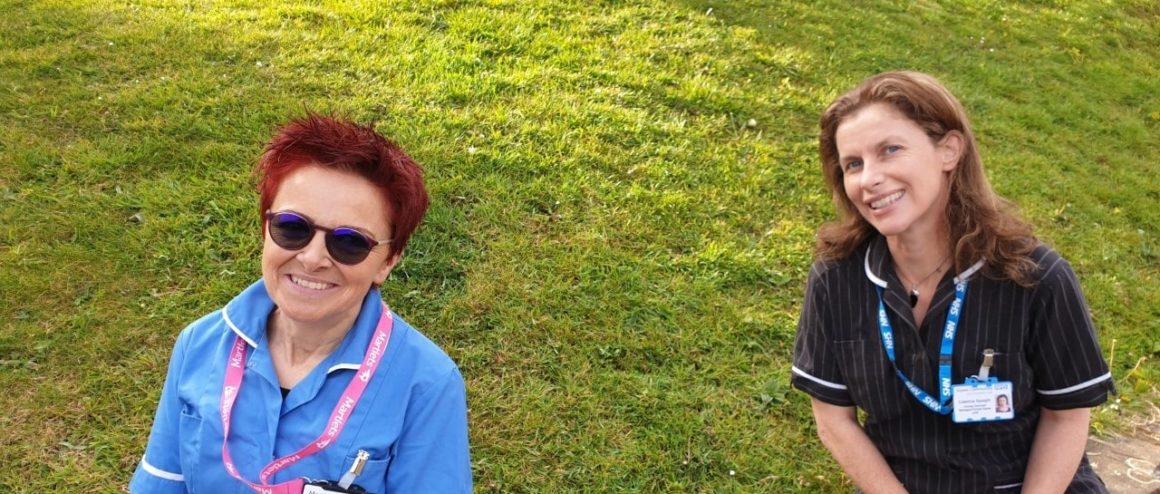Martlets continues to collaborate with the Homeless Health Inclusion Team. This is so that hospice care is fully accessible to the vulnerably housed and people who are experiencing homelessness towards the end of their lives. Senior Staff Nurse Helen Lyons explains how local organisations are working together to help.
Martlets is committed to exploring different ways of offering best care for everyone in the community who is affected by terminal illness, whatever their needs and backgrounds.
Two years ago, Martlets successfully applied for a grant from the Masonic Charitable Foundation Trust. This was through Hospice UK to extend the reach of hospice care. The funding was to support collaborative teaching for 150 frontline staff who are supporting people experiencing homelessness.
Helen was the initiative’s lead nurse and we previously posted a blog about the project. She and her colleagues created a practical teaching module about caring for this vulnerable client group. Which was taught to frontline staff in Brighton and Hove.
The Homeless Health Inclusion Team in Brighton and Hove consists of trained nurses, healthcare assistants, and physiotherapists and occupational therapists. They all work together to provide holistic care.
“Not only have we collaborated in the teaching of frontline staff, but we have also established closer working relationships by learning about each other’s specialties,” says Helen.
Martlets’ community nursing team continues to work closely with local organisations to ensure that vulnerable people in our community receive the care they need towards the end of their lives.
“Every year, Arch Healthcare GP surgery in Brighton puts on a conference to support healthcare for people affected by homelessness,” says Helen. “This year we were back meeting face-to-face. It was great after a couple of years of it taking place online during COVID.”
The conference is primarily for frontline staff working with people experiencing homelessness. However, many healthcare professionals also attend. This year Helen and the Martlets team were invited to give a presentation.
“We were asked to present about the teaching we put together as part of the project a couple of years ago,” Helen explains. “We did a mini version of our collaborative teaching session, and the feedback was really positive. Our remit was to provide teaching to frontline staff; to help them recognise outward signs of deteriorating health in their clients who are experiencing homelessness in the hope that referrals for palliative care support are made earlier.”
‘Research shows that people who are experiencing homelessness have early-onset aging and can die on average 30 years earlier than people in the general population. There’s an inequality in their healthcare which we are helping to address through improved collaboration.’
People who are experiencing homelessness often have complex needs which have a serious impact on their physical health.
“They have often experienced a lot of trauma in their younger lives,” says Helen. “Perhaps as a result of childhood abuse or growing up in care. They may have been a war veteran, or if they have been in prison. Sometimes they are dealing with substance misuse as a way of trying to cope with this trauma. All this can massively affect their long-term health.”
‘If you have a history of trauma, you might be more fearful of coming into a hospice and want to live out the end of your life in familiar surroundings – perhaps the hostel you are staying in. Community nursing is so important as we provide hospice care at home, wherever that is.’
Helen is part of a working group at Martlets. They continues to provide much-needed care for this patient group out in the community. Martlets’ community team is working with lead nurses across the South East with a view to collaboration with other hospices in the region. And end-of-life doulas offer support to both hostel clients and staff. (An end-of-life doula offers emotional, practical and, if it’s wanted, spiritual care to people. That could look completely different for each client, depending on their needs and their wants. Read our blog about Li, an end-of-life doula who supported Becca, a Martlets patient for eight months at the end of her life).
“End-of-life doulas do a wonderful job of offering emotional support. As well as practical companionship for people who are vulnerably housed,” says Helen. “Often there aren’t close friends or family around to offer that. They may also be able to support hostel staff who are dealing with some very difficult situations. By working together, we can improve healthcare for this vulnerable client group. And our Hospice at Home team can go in to offer clinical care for people approaching end-of-life.
‘Caterina Speight of the Homeless Health Inclusion Team has applied for a Nursing Times award for this project under the category of collaborative working. We’ve been shortlisted for the award which is great. Also, we have been asked to present at the national Hospice UK conference. This is to be held in Glasgow later this year.’
Also Helen and her colleagues are hoping to be involved in a national ‘train the trainer’ scheme. The scheme will offer teaching to healthcare professionals about how to support people experiencing homelessness. Also It will also identify and manage their palliative care needs.
“We are also going to be working with Housing First,” adds Helen. “This is a housing project that prioritises keeping people in one home longer term. Hostels sometimes have a limit on how long people can stay. We are working with them to identify clients who may be experiencing frailty at a young age and who may have unmet palliative care needs. And looking further ahead, we are connecting with other community organisations and clinicians who support people with learning difficulties. So, there are several different avenues we are looking into in terms of how we can best care for everyone in our community who is affected by terminal illness, whatever their needs and backgrounds.”
Published 21/07/2022
